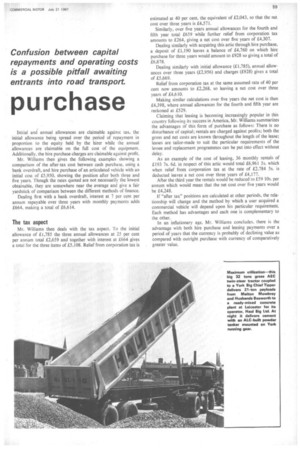Confusion between capital repayments and operating costs is a possible pitfall awaiting entrants into road transport.
Page 69

If you've noticed an error in this article please click here to report it so we can fix it.
purchase
Initial and annual allowances are claimable against tax, the initial allowance being spread over the period of repayment in proportion to the equity held by the hirer while the annual allowances are claimable on the full cost of the equipment. Additionally, the hire purchase charges are claimable against profit.
Mr. Williams then gives the following examples showing a comparison of the after-tax cost between cash purchase, using a bank overdraft, and hire purchase of an articulated vehicle with an initial cost of £5,950, showing the position after both three and five years. Though the rates quoted are not necessarily the lowest obtainable, they are somewhere near the average and give a fair yardstick of comparison between the different methods of finance.
Dealing first with a bank overdraft, interest at 7 per cent per annum repayable over three years with monthly payments adds £664, making a total of £6,614.
The tax aspect Mr. Williams then deals with the tax aspect. To the initial allowance of £1,785 the three annual allowances at 25 per cent per annum total £2,659 and together with interest at £664 gives a total for the three items of £5,108. Relief from corporation tax is estimated at 40 per cent, the equivalent of £2,043, so that the net cost over three years is 14,571, Similarly, over five years annual allowances for the fourth and fifth year total £659 while further relief from corporation tax amounts to £264, giving a net cost over five years of £4,307.
Dealing similarly with acquiring this artic through hire purchase, a deposit of £1,190 leaves a balance of £4,760 on which hire purchase for three years would amount to £928 so giving a total of £6,878.
Dealing similarly with initial allowance (£1,785), annual allowances over three years (£2,956) and charges (£928) gives a total of £5,669.
Relief from corporation tax at the same assumed rate of 40 per cent now amounts to £2,268, so leaving a net cost over three years of £4,610.
Making similar calculations over five years the net cost is then £4,398, where annual allowances for the fourth and fifth year are reckoned at £529.
Claiming that leasing is becoming increasingly popular in this country following its success in America, Mr. Williams summarizes the advantages of this form of purchase as follows: There is no disturbance of capital; rentals are charged against profits; both the gross and net costs are known throughout the length of the lease; leases are tailor-made to suit the particular requirements of the lessee and replacement programmes can be put into effect without delay.
As an example of the cost of leasing, 36 monthly rentals of £193 7s. 6d. in respect of this artic would total £6,961 5s. which when relief from corporation tax at the rate of £2,784 5s. is deducted leaves a net cost over three years of £4,177.
After the third year the rentals would be reduced to £59 10s. per annum which would mean that the net cost over five years would be £4,248.
If "after tax" positions are calculated at other periods, the relationship will change and the method by which a user acquired a commercial vehicle will depend upon his particular requirement. Each method has advantages and each one is complementary to the other.
In an inflationary age, Mr. Williams concludes, there is the advantage with both hire purchase and leasing payments over a period of years that the currency is probably of declining value as compared with outright purchase with currency of comparatively greater value.












































































































